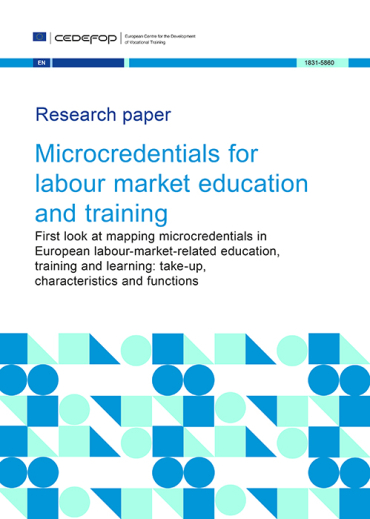Cedefop's research on microcredentials sheds light on this growing trend in education and training, its benefits and limitations as well as the challenges that must be dealt with if its value is to be maximised for workers, learners and the labour market.
As an extended article by Cedefop experts Anastasia Pouliou and Konstantinos Pouliakas notes, 'policymakers, educators and trainers across the world see microcredentials as an innovation with various uses and benefits: a kind of all-purpose solution for the problems confronting education, training and labour market systems.
But can microcredentials enhance employability, labour market participation and outcomes among end users? Can skills assessments and micro-certificates awarded in specific sectors support individuals in finding work or in improving the match of their skills with their job?'
Data show that the microcredentials' value varies across national VET systems and industry sectors, and that ensuring employers’ trust in their value remains a key policy challenge.
A Cedefop study on crowdlearning highlights the limitations of online courses and certification tests, as employers prefer to use profile introductions, portfolios and job feedback to assess a freelancer’s skills and experience rather than skills certificates alone.
Read the full article: 'Labour market value of microcredentials: a conduit to better work?'
Italian freelance translator Julia, surveyed for the study, noted: 'I don’t need certification because it’s just, actually, it’s just a paper. And, so for example, on FutureLearn, you study and you do exactly the same thing as someone else that is going to get the certification. So, you are going to learn the, the same. But, you pay, for example, forty or sixty pounds to get a paper saying that you attended the course online, so it’s not very useful, I think.'
However, the coronavirus pandemic accelerated digitally mediated forms of learning and certification for many workers. Cedefop's second European skills and jobs survey reveals that 38% of the EU+ workforce undertook at least one online education and training activity during 2020-2021, while seven in ten of those online learners, corresponding to one in four EU+ adult workers, earned at least one certificate or award after completing an online education or training activity.
Southern European countries, typically characterised by some of the highest qualification mismatch rates in Europe, are home to the majority of those online learners, workers employed in the primary sectors of agriculture, forestry or fishing, along with those in the secondary sectors of utilities (e.g. water and electricity supply) and in healthcare are most likely to have earned a certificate following online training.
Workers who obtain a digital certificate are also typically in jobs with higher skill demands, and the unemployed or inactive who decided to follow an online education or training activity are least likely to have gained a credential, perhaps a reflection of their limited resources and/or motivation fully to engage in digital learning.
Read the full article: 'Labour market value of microcredentials: a conduit to better work?'


